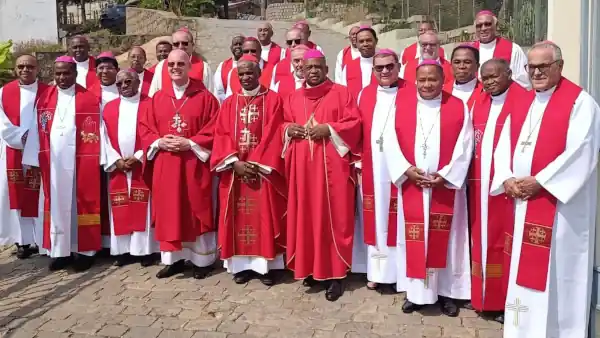07 December - Ambrose is said to have been born in Trier in 340, the son of an Ambrosius, prefect of the Praetorium of the Gauls. At the age of 25, like his father, he becomes a high-ranking Roman civil servant in the imperial administration.
According to the Life of Ambrose, written by his secretary Paulin of Milan, his birthplace was in the praetorium. One day while he was sleeping there, a swarm of bees suddenly appeared and covered his face and mouth in such a way that it seemed as if insects were entering and leaving his mouth. The bees then took flight and rose into the air to such a height that the human eye could no longer distinguish them. The event struck his father who said: "If this little child lives, it will be something big". When they left his face, the bees had left a little honey on it. This was seen as a harbinger of his eloquence. As a teenager, he saw his mother and sister, who had consecrated her virginity to God, kissing the hand of the priests. As a joke, he held out his right hand to his sister, assuring her that she should kiss it as she had kissed the priests' hands. But she refused, considering Ambrose as a child and someone who does not know what he is saying.
In Rome he received an education that enabled him to become a lawyer. Then the prefect of the pretorium of Illyricum, with whom he worked from 370 onwards, entrusted him with the administration of the province of Liguria-Emilia, whose seat was in Milan. In 374, he intervened in this capacity to restore order during the election of the successor to the bishop of Arian tendency, Auxence. He was not yet baptised, but the two parties chose him as bishop of Milan. Ambrose occupied the episcopal see of Milan from 374 to 397. Skilfully and forcefully, he defended the rights of the Church against the Emperors Valentinian I, Valentinian II and even Theodosius the Great, of whom Milan was then the capital. Ambrose transferred the meditation of the Scriptures begun by Origen to the Latin world, introducing the practice of Lectio divina to the West.
Ambrose of Milan composed hymns (8 stanzas of 4 short verses), introducing liturgical chant to the West and giving it an "official" form. Ambrosian hymns continue to be sung in the liturgy of the hours, and Latin hymns continue to be composed according to his model. He is also said to be the originator of polychoral chant, also known as antiphonal chant, which was used by Heinrich Schütz among others. It has been said of Ambrose that he was more of a catechist than a theologian. It should be noted that he was a great connoisseur of Greek patristic literature, which he used in his works. He produced doctrinal writings. Ambrose died on April 4, 397. Both the Orthodox Church and the Roman Catholic Church venerate him on 7 December, to commemorate his episcopal ordination.








